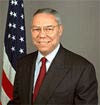

|
Powell: US Open to New Dialogue with Iran David Gollust State Department 30 Dec 2003, 21:14 UTC VOA News  The United States said Tuesday it is ready for a political dialogue with Iran, but it says such a development would depend on Iran ending support for terrorism and otherwise fulfilling international obligations. The two countries have had rare direct contacts in recent days on U.S. earthquake relief aid.
The United States said Tuesday it is ready for a political dialogue with Iran, but it says such a development would depend on Iran ending support for terrorism and otherwise fulfilling international obligations. The two countries have had rare direct contacts in recent days on U.S. earthquake relief aid. The more positive tone toward Iran was sounded by Secretary of State Colin Powell, who told The Washington Post in an interview published Tuesday that "encouraging" moves by Iran have raised the possibility of dialogue between the two countries, which have not had diplomatic ties since 1980. U.S. officials say Mr. Powell was referring to, among other things, Iran's recent decision to allow snap international inspections of its nuclear facilities, and its acceptance of direct U.S. relief aid after last Friday's devastating earthquake. Mr. Powell said the moves appear to show a "new attitude" in Iran, though not "total generosity," on dealing with issues of concern to the United States and others. He said Washington should keep open the possibility of dialogue "at an appropriate point in the future." The Powell comments were echoed here by State Department spokesman Adam Ereli, who said U.S.-Iranian contacts on earthquake assistance and Tehran's nuclear inspection promises, are positive and encouraging signs that are worth noting. However, Mr. Ereli said that does not diminish the "serious concerns" the United States has about Iran's policy and behavior, including support for terrorism and efforts to acquire weapons of mass destruction, and that action by Tehran will be needed if the relationship is to improve. "What's important are actions," he said. "What's important is seeing follow-through. What's important are meeting international commitments. And that's what we're looking for, in the area of WMD, in the area of stopping support for terrorists, in the area of cooperating in the fight against terrorism, particularly concerning al-Qaida leaders that Iran has information about. So these are all aspects of our policy that we want to see actions on." The two countries, without formal relations for more than two decades, have had only occasional diplomatic contacts. But Deputy Secretary of State Richard Armitage telephoned Iran's U.N. ambassador, Mohammed Zarif, early Saturday in Tehran to offer earthquake assistance. The Iranian official quickly called back with his government's acceptance, clearing the way for unprecedented direct U.S. relief flights to Iran. Spokesman Ereli said the American aid offer was strictly a humanitarian gesture and not motivated by political concerns. But he said Iran's acceptance cannot be seen as anything but a positive development. Elements of an 84-member delegation of U.S. relief and rescue experts arrived at the earthquake scene in the southeastern Iranian city of Bam Tuesday. The Bush administration also committed additional material help, including thousands of blankets and hundreds of rolls of plastic sheeting to help shelter earthquake survivors.
|